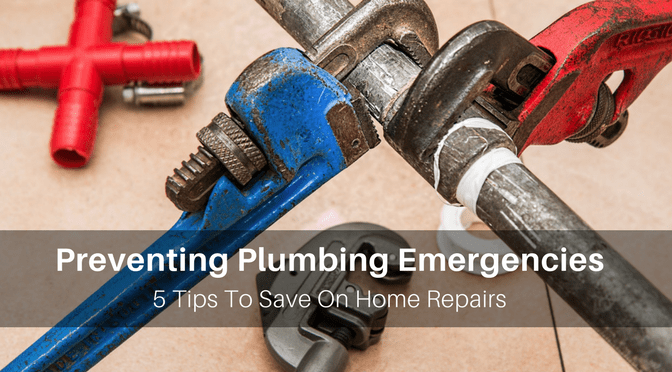Plumbing Emergency callouts are one of our most common jobs. These typically come in the form of burst pipes or runaway leaks – often resulting in extensive structural or water damage. Sometimes, these accidents are unavoidable. Other times, good home maintenance practices can minimise the damage or even prevent the emergency from occurring. As much as we enjoy being able to help in these situations, it is always a shame to see a family faced with the cost of hundreds or thousands in damages that are ultimately preventable.
Below are our top tips to help prevent plumbing emergencies and costly damage.
1. Know Your Plumbing Layout
. Become familiar with where the pipes run in your walls, which are bringing water in, and which are carrying it out. The better you know your system, the more quickly and easily you will be able to assess future problems and navigate DIY projects.
 2. Know Where Your Main Water Shutoff Valve Is Located
2. Know Where Your Main Water Shutoff Valve Is Located
. If you experience a major leak, one of your first moves should be to shut off the water at its source. Be sure that you know the location of your home’s water shutoff valves. These can usually be found near the meter where the water first enters your house. In addition to this, most homes have individual shutoffs for different rooms, allowing you to cut off water to one room while still maintaining the flow throughout the house. Sometimes this is in the form of a lever, but sometimes a screwdriver will be needed. With this in mind;
3. Have An Emergency Toolkit On Standby. 
Just like a good household plunger, you shouldn’t wait until you need one of these tools to go out and get one. Having these on hand can save valuable time in the face of a plumbing emergency. These items should be kept within reach in your hall closet or someplace quickly accessible between your kitchen, bathroom or other locations prone to emergency.
o Adjustable wrenches of various sizes.
o Tongue and groove pliers.
o Sealing tape or duct tape – Temporarily stop small to moderate leaks in a pinch.
o Rags and a large bucket – Don’t scramble when your pipes burst. Having these on standby can make a big difference.
o A flat and Phillip’s head screwdriver.
 4. Know The Life Expectancy Of Your Large Appliances
4. Know The Life Expectancy Of Your Large Appliances
. This is especially true if you are renting out a home or apartment, and didn’t purchase these fixtures yourself. Large appliances such as dishwashers, refrigerators, and water heaters become prone to leaking or malfunctioning as they get close to the end of their expected lifetime. Often, upgrading these appliances means the potential for a more energy and cost-efficient model , as well as preventing potential emergencies. In the meantime,
o Have your water heater professionally inspected every two or three years for potential issues that may occur.
o Turn off the water supply to your washing machine when you are away for extended periods of time in case of leaks.
o Examine hoses periodically for leaks or cracks.
Thoroughly Research Repairs And Projects
– going blind into a DIY project can easily lead to worse problems in the long run. Make sure that you thoroughly research any upcoming projects or repairs before making any changes to the construction or layout of your homes. If you are experiencing a leak or a clog in an unfamiliar area, consult an expert before trying to tackle the issue yourself.
Other Tips
– Don’t hang things from exposed pipes. This is especially true with laundry. The combined weight of wet clothing can add up, especially with these fixtures that are not built to support weight. The strain of this can easily result in burst pipes and water damage.
– Keep a plunger in every bathroom. When a leak or backup appears, you don’t want to be scrambling for room to room for the single household plunger. Keep one handy in each bathroom as well as the kitchen – and make sure that it is the appropriate design (standard or flange) for its intended drain.
– Don’t flush anything other than human waste and toilet paper. This includes new ‘flushable’ wipes on the market. These wipes have a tendency not to break down in water as standard paper does, and can lead to stubborn and damaging clogs.
 – Little problems can quickly escalate. It may not be a problem now, but small leaks, the odd crack or other minor problems are often indicative of larger problems that can quickly turn into plumbing emergencies – not to mention each of those little drops can make a big difference on your household bills at the end of the year. Keeping on top of minor household repairs while they are minor is the easiest and safest way to reduce the chances of a plumbing emergency.
– Little problems can quickly escalate. It may not be a problem now, but small leaks, the odd crack or other minor problems are often indicative of larger problems that can quickly turn into plumbing emergencies – not to mention each of those little drops can make a big difference on your household bills at the end of the year. Keeping on top of minor household repairs while they are minor is the easiest and safest way to reduce the chances of a plumbing emergency.
As a final point, make sure that you have the number of an emergency plumber on hand. When major problems occur, there is no prevention tip better than having a solid and reliable plan of action.
